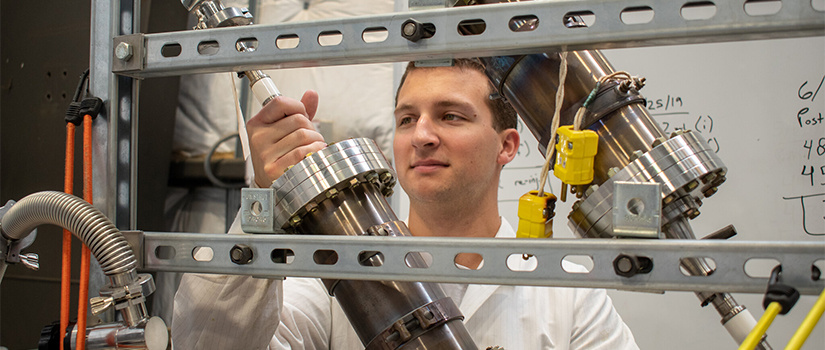Why Nuclear Engineering Graduate Study?
Nuclear engineering is a diverse and interdisciplinary field. You will find nuclear engineers working in a range of fields including power, especially electricity generation, nuclear safeguards and security, materials science and engineering, medicine and radiological sciences, and space power and propulsion.
The 2020 median pay for nuclear engineers was more than $125,130, according to the Bureau of Labor and Statistics, which is second only to petroleum engineering.
Programs of Study
Our nuclear engineering graduate degrees include the Master of Engineering (M.E.), which is perceived to be more practically oriented and the Master of Science (M.S.), which is considered more scholarly or fundamental and includes a thesis. The Doctor of Philosophy (Ph.D.) is the highest engineering degree a person can achieve, and the focus is research. But that doesn’t mean you’ll just spend years locked away in laboratory. Our nuclear engineering Ph.D. students collaborate with faculty and other researchers to develop the skills to conceptualize, conduct and manage projects that advance the application of nuclear energy in the civilian and government sectors.
Programs of study for the M.S., M.E. and Ph.D. graduate programs in nuclear engineering include four core courses encompassing the following topics:
- Introduction to Nuclear Engineering
- Nuclear Fuel Cycles
- Radiation Shielding
- Reactor Systems
Additional engineering and technical elective courses give individual students the opportunity to tailor the program of study in nuclear engineering to meet their interests under the direction of a faculty advisor.
Visit Graduate Handbooks and Curricula for additional detail.
If your aim is a career in academia or in an industrial or government research and development laboratory, you'll need to earn the highest degree a nuclear engineer can get. Complete a research-based dissertation, grounded in coursework, in just four years beyond your B.S. degree.
Major components of the nuclear engineering Ph.D. program include:
- Research resulting in a dissertation proposal, a dissertation, a dissertation defense, and 12 hours of dissertation credit
- Qualifying and comprehensive exams
- 48 credit hours of graduate-level coursework in and related to nuclear engineering and including the core course requirements
Up to 30 of the total credit hours may be transferred from a previously completed master’s degree.
Nuclear Engineering Ph.D. students develop the ability to execute a research plan, to generate and analyze original results, and to communicate those results through oral presentations and written publications.
Demonstrate your technical acumen and ratchet up your career objectives. This research-oriented graduate degree requires a thesis and 24 hours of graduate coursework.
Major components of the nuclear engineering M.S. program include:
- Research resulting in a thesis, thesis defense, and 6 hours of thesis credit
- A comprehensive exam
- 24 credit hours of graduate-level coursework in or related to nuclear engineering
- Not fewer than 12 credit hours taken at the 700-level or above
Graduates of the Nuclear Engineering M.S. program have the skills needed for life-long learning and professional development.
Become a more-competent engineer with just 30 hours of graduate course work beyond your B.S. This non-thesis graduate degree is especially great for working engineers who cannot easily access a research laboratory.
Major components of the nuclear engineering M.E. program include:
- A comprehensive exam
- 30 credit hours of graduate-level coursework in or related to nuclear engineering
- Not fewer than 15 credit hours taken at the 700-level or above
The M.E. in nuclear engineering will prepare you to tackle difficult projects and to develop designs, solve problems, and make impactful decisions.
Areas of Specialization
Nuclear engineering students work with faculty in a number of laboratories performing research related to nuclear fuels and structural materials, thermal hydraulics, and advanced modeling and simulation.
Nuclear Fuels and Structural Materials: Study advanced fuel fabrication and testing within a research lab that includes high temperature controlled atmosphere and induction furnaces, along with a custom-built, fluidized-bed, chemical vapor deposition system. Characterize nuclear fuels for particle size, porosimetry, density, and surface area analysis. Conduct thermogravimetric and differential scanning calorimetry studies at temperatures up to 2250 K.
Thermal Hydraulics: Conduct research with thermal hydraulic test loops and laboratories that are dedicated to studies of enhanced heat transfer, fluid flow, pressure drop and other phenomena associated with nuclear fuel rods and assemblies. Examine the impact of nanofluids on the development and performance of thermal and hydrodynamic boundary layers using stereo vision Particle Image Velocimetry and micro-planar Laser Induced Fluorescence techniques.
Advanced Modeling and Simulation: Use our high-performance computing facilities to analyze and model nuclear reactors, advanced fuel cycles and advanced nuclear fuels and materials. Apply modeling and simulation codes and tools for neutronic, thermal hydraulic, computational fluid dynamics, thermochemical, safety and risk, shielding and finite element analyses.
Visit the Mechanical Engineering Department for more information on our faculty and research areas
Graduate Admissions
All applications must be submitted to the Graduate School of the University of South Carolina. The Graduate School provides helpful information on the admissions application process and even lets you know what to do before you apply.
Admission is competitive. Applicants are expected to have an earned baccalaureate degree in engineering or related field, with at least a B average. Admissions and eligibility for financial aid also depend upon GRE scores; minimum scores are generally a GRE-V of 150 and a GRE-Q of 155. Students whose native language is not English must submit a satisfactory score on an English proficiency test. The Accepted English proficiency tests include the TOEFL exam (minimum score of 80 on the internet-based test), IELTS International Academic Course Type 2 exam (minimum score of 6.5), and the PTE Academic (minimum score of 53).
